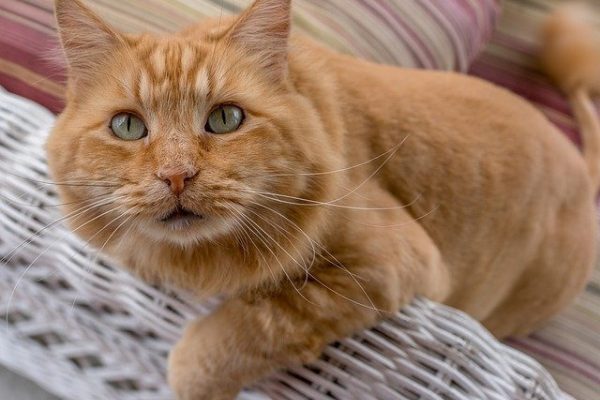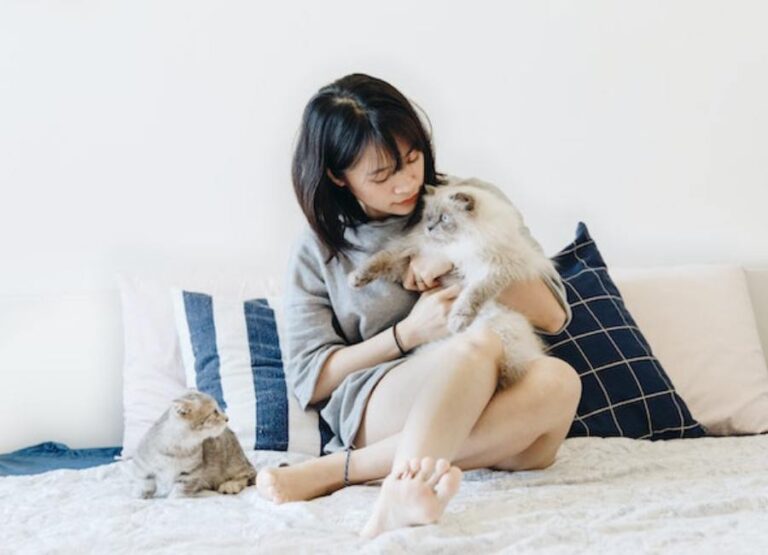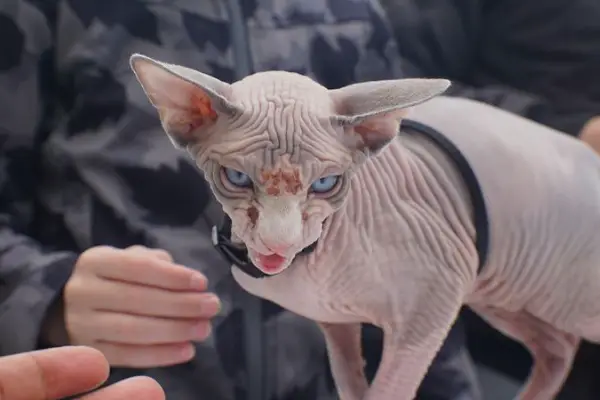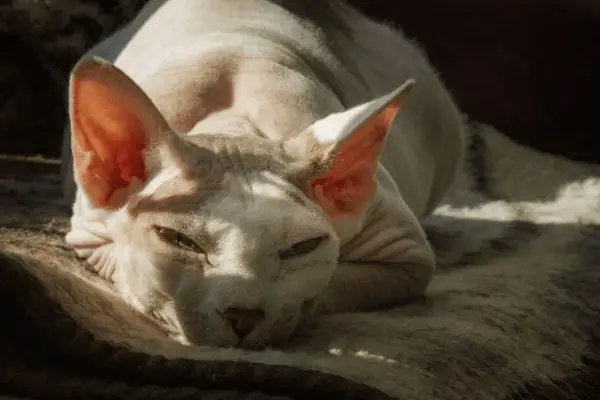11 Common Mainecoon Cat Behavior Problems & Solutions

Mainecoons are the most popular breeds of cats, Mainecoon lovers always want to know Mainecoon cat behavior problems.
In this post, we will be discussing all the possible Mainecoon cat behavior problems you should expect.
We will also outline and discuss some possible solutions to the Mainecoon cat behavior problems.
Before I draw up this list of behavior problems, I contacted lots of Mainecoon owners to seek their opinions.
While some see these behaviors as problems, others don’t, so what you get in this post is my interaction with real Mainecoon owners.
Mainecoon cats are not naturally violent felines, although they will become aggressive if attacked or disturbed.
While Mainecoons are recognized for being friendly, they can become violent as a result of inadequate socialization, bad environmental conditions, or a medical problem.
Find out more about the 26 useful guides on how to care for a Mainecoon cat!
Mainecoon Cat Behavior Problems
Here are some common behavior problems you should expect from living with a Mainecoon cat:
Mainecoons cats love to scratch furniture when bored
When Mainecoons are bored or lonely and have nothing to do, they are known to get fixated, which can lead to undesirable behaviors.
If you don’t pay attention to a Mainecoon cat that is demanding your attention, or if you don’t trim their claws, they may scratch your furniture.
They may scratch your furniture to remove dead nails or claws that you have failed to remove, or they may scratch it to keep them from being bored.
Solutions
If you’re short on time, a scratching board might help keep them away from your furniture.
Another easy solution is to get a companion cat or dog because Mainecoons do better when they have other pets around than when single.
Provide more mental stimulation exercises for your Mainecoon cat.
Invest more in interactive toys and automatic treats dispensers.
Mainecoon cats are extremely vocal on need
This is one of the most common Mainecoon cat behavior issues, and most Mainecoon owners struggle with it.
When a Mainecoons needs anything, they’ll say so loudly, and if you don’t listen, they’ll become angry, clawing things or wailing.
Mainecoons always want to be in control; if you’re standing, for example, they won’t stop until you sit down with them.
When they need something, even if it’s something they can obtain without you, Mainecoon cats might become too loud.
Mainecoons are known to talk too much for different reasons.
Solutions
Cats meow to communicate with one another, to attract attention to a problem, to show displeasure or grief, or to want attention.
It’s up to you to choose when the meow is necessary, as well as to check for things like empty water bowls and other problems.
A loud meow, on the other hand, might signal a request for more food or attention, as many cat owners are aware.
Create a technique that satisfies the cat’s needs without teaching it that yowling operas produce the desired result.
Remember that retraining your cat may take some time and that certain breeds, such as Mainecoon cats, are loud even when they aren’t trying to be.
Tips:
- Consult a veterinarian about a specific diet.
- Consider or take a look at a food puzzle.
- Don’t give in to begging.
- Maintain a feeding schedule.
- Replace your manual feeder with an automated one.
- Make sure the cat can navigate the space.
- Getting a second cat is a good idea.
- Before going to bed, play with the cat.
- Give your cat something to do in the evenings.
- Consult a veterinarian about a specific diet.
- Check with your veterinarian to see whether your cat has been spayed or neutered.
- Make sure your cat isn’t in any discomfort.
- Set up a cat door.
- Assist your cat in adjusting to change.
- Boredom or loneliness should be addressed.
- Clicker training can be used to reward silence.
Here are some useful tips on how to introduce a Mainecoon to a dog.
Mainecoons prefer to avoid litter boxes when bored or sick
Mainecoon cats tend to avoid litter boxes when bored or ill.
It’s most common when you first bring your Mainecoon cat home, and it might suggest a lack of litter boxes in their new home or a need for a cleaner litter box.
When you bring a new family member home, even if they haven’t shown any symptoms of litter box difficulties previously, Mainecoons can adopt this tendency.
Anxiety or a lack of comfort in your Mainecoon’s habitat might be one reason for frequent litter box issues.
Solution
If your cat starts avoiding the litter box for no apparent reason, it may be due to a medical issue.
A veterinarian visit should be made to rule out medical reasons.
You should also provide numerous litter boxes for your Mainecoon cat.
Read more: Are Mainecoon Cats Aggressive (12 Aggressive Triggers & Prevention).
Mainecoons enjoy waking up their owners too early
This is one of the most common Mainecoons behavior problems seen by most Mainecoon owners.
Mainecoons have a reputation for resting a lot during the day and being active at night.
When their owners are around, Mainecoons are often active cats.
When their owners sleep while they’re awake, they don’t like it.
Most Mainecoons will wake you up between 4:30 and 5:00 a.m., even if their litter box is free and close to where they slept.
Your Mainecoon’s will start scratching your elbow and bouncing about you till you wake up in the morning when you’re sleeping soundly.
I simply think they’re selfish because your Mainecoon will be sleeping while you’re at work, and they’ll just wake you up when it’s time for you to take your early morning snooze.
Solutions
Make sure Mainecoon cats have expended all of their energy before putting them to bed to avoid this kind of behavior.
Playing a late fetch game with your Mainecoon cat might help you avoid waking up too early.
You can also provide lots of interesting and interactive toys to keep your Mainecoon busy in the morning or provide any type of distraction.
Mainecoons always seek for constant companionship
Mainecoons are always interested in what their owners are doing and want to be close to them at all times.
If you allow it, your Mainecoon will follow you around all day and can result in a behavior problem if you are away.
Mainecoon cat is an active cat with lots of energy and needs lots of activities or get into behavior issues.
They are prone to separation anxiety when you are not paying attention to them, they can spoil things or even bite out of frustration.
Solutions
You’ll need to invest in some beautiful moving toys to keep your Mainecoon amused while you do other things if you want to live in peace with them.
It’s simply better to get a second pet to keep them busy and off your back for a while.
However, if you had all of your time to yourself, you would be an excellent buddy.
You’ll need a second pet to keep them amused when you’re gone because they were specifically developed to be a human companion.
You can also provide a lot of interesting and interactive toys to keep them from getting bored.
Mainecoons easily get into play aggression
Play aggressiveness is the most prevalent type of cat aggression in Mainecoon cats, and it generally manifests itself as your cat roughhousing.
Your Mainecoons can get into highly rough play that can hurt you if you don’t have adequate training.
Mainecoons, in my view, play hard and when they become furious and slam a toy across the room, they give it their all!
Solution
Trim your Mainecoon cat’s nails if you want to decrease the amount of harm.
Proper training is also a solution to play aggression, again you can also use positive reinforcement to fix your Mainecoon.
Always reward your cat when they calm down during play time, however this play aggression slows down as they grow older.
Mainecoon cats can develop territorial issues
A foreign animal in their area does not sit well with Mainecoons. They also like having and marking their territory.
This is why some people don’t recommend getting a Mainecoon cat since they can get into pointless fights with other cats.
They are powerful and have excellent hunting skills, and they can quickly kill any other cats who enter or attempt to cross their area.
If you’re adopting a new cat, there are a few things you can do to make the transition as smooth as possible.
Solutions
It’s an easy problem to address if you approach it the correct way, rather than constantly yelling at them or locking them up.
Proper and early socialization is one of the most suggested strategies for resolving territorial aggressiveness in Mainecoon cats.
When your Mainecoon cat is a kitten, be sure to introduce them to other cats.
This will help them realize that other cats and animals are not a threat to them.
When cats feel threatened, one of the reasons they leave home for days is to fight for territory. So keep an eye on your Mainecoon.
Early socialization and exposing your Mainecoon to the object of fear is the best solution to territorial issues.
Mainecoons like to explore everything and they always get trapped
Mainecoon cats are prone to get stuck in cages, cat carrier, and even closets, cabinets, and cupboards.
Mainecoon cats are among the most curious house cats, always wanting to know what’s going on around them.
They are usually stuck or stranded in their exploring region due to their unquenchable curiosity.
For the record, Mainecoon cats are one of the best climbers and will always get into areas they may get stocked.
Solution
Simply ensure that all shelves are closed or maintained open at all times to avoid becoming trapped.
You may also make your home cat-proof, especially any locations where cats might get stuck.
Mainecoons are prone to destructiveness when bored
Mainecoon cats are prone to destructive behavior when bored.
When bored and able to escape, a Mainecoon cat will cause more damage than an average alley cat.
This is due to the fact that they are high-energy cats who require a lot of mental stimulation and exercise.
If you aren’t constantly accessible or the cat doesn’t have a friend, getting a Mainecoon cat is a mistake.
Boredom and this pervasive problem behavior go hand in hand.
Mainecoon cats may become destructive if they aren’t provided enough stimulation.
Because they’re such high-energy cats, it’s easy for them to become bored.
Solution
To assist you and your Mainecoon cat, do your best to keep them company, or they will scratch furniture.
One of the most amazing characteristics of Mainecoon cats is that they love participating in home activities.
So find something to keep them engaged with, or acquire a second pet.
Find out more about Mainecoon grooming tips and the benefits of grooming!!!
Mainecoons are prone to separation anxiety
Separation anxiety is a frequent behavior issue in Mainecoons.
Mainecoon cats are more prone to loneliness than other breeds due to their extremely sociable temperament and tight ties with their companions.
Unfortunately, no matter how modest your Mainecoon cat’s behaviors are at first, if you do nothing to address the problem, it will most certainly worsen.
This problem is simple to solve, but if you go about it the wrong way, you’ll wind up with a ferociously scratching and biting Mainecoon cat.
Solution
Separation anxiety in Mainecoons may be tough to overcome, especially if everyone in the home is obliged to work long hours.
To keep them engaged while you’re gone, you might offer them extra toys.
Getting a second Mainecoon cat or dog is the best way to alleviate separation anxiety in a Mainecoon cat.
Getting a second cat, whether it’s a Mainecoon or another breed, is something I strongly recommend. You can even get a dog if you like.
They may not get along straight first, but with another high-energy cat in the mix, they’ll probably become friends sooner than you expect.
Mainecoons are prone to depression
Maine Coon cats are noted for being lively, energetic, and active. They enjoy being kept active at all times.
Most Mainecoon cats develop depressions as a result of separation anxiety, loneliness, or a continuous change of habit.
If depression in Mainecoon is not treated or managed, it might lead to unnecessarily violent behavior toward other family members.
A sad Mainecoon cat may flee at any chance and become a wild cat, or it may resort to biting and nipping.
Solutions to depression in Mainecoons
Here is how to help a depressed Mainecoon cat which is as follows:
- For medical advice, contact your veterinarian.
- Start a mental-stimulating activity, such as puzzle games.
- Treats and food with a strong odor should be provided.
- New and engaging toys, such as the electronic fish, should be available.
- Take your Mainecoon cat for a stroll in the evening.
- For your Mainecoon cat, create an artificial water fountain or pool.
- Spend some additional time with your Mainecoon cat.
- Create a clean window with a nice view of the outside world.
- Purchase more cat trees or shelves.
- Leave your cat alone when they want to be alone.
- Get a second pet to avoid unnecessary reoccurrence of depression.
Find out reasons why Mainecoons are a friendly cat and why you should get one.
How to stop unwanted behaviors in Mainecoons
Here are some interesting tips to help you stop some unwanted behaviors in your Mainecoon cat;
- Recognize and treat your Mainecoon cat’s emotional and physical needs.
- As your Mainecoon kitten develops, assist it in developing good habits.
- Your Mainecoon must be properly socialized from the time it is a kitten.
- A second pet should be supplied, either a cat or a dog.
- If you don’t have to, don’t shout at your cat; instead, be patient and make the necessary modifications.
- Examinations by a physician are required.
- Invest in a huge quantity of toys.
- Give your cat some exercise every day.
- Always reward positive behavior and discourage the bad behaviors.
- Always use positive reinforcement and not bad or harsh reinforcement.
Find out reasons why you shouldn’t or why you should let your Mainecoon go outside.
Causes of aggression in Mainecoon cats
Here are some common causes of aggression in Mainecoons:
- State of mental health
- Feeling threatened by other pets
- Boredom
- Over stimulation
- Pain
- Stress
- Loneliness
- Lack of socialization
- Health issues
- Hormone disorders
- Abuse and neglect
Cheers! Am outta!!!





![New Cat Hiding And Not Eating [Explained] New Cat Hiding And Not Eating](https://petcreeks.com/wp-content/uploads/2023/02/New-Cat-Hiding-And-Not-Eating-768x555.jpg)
